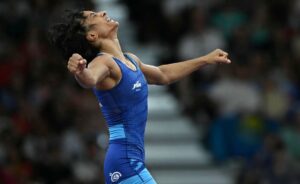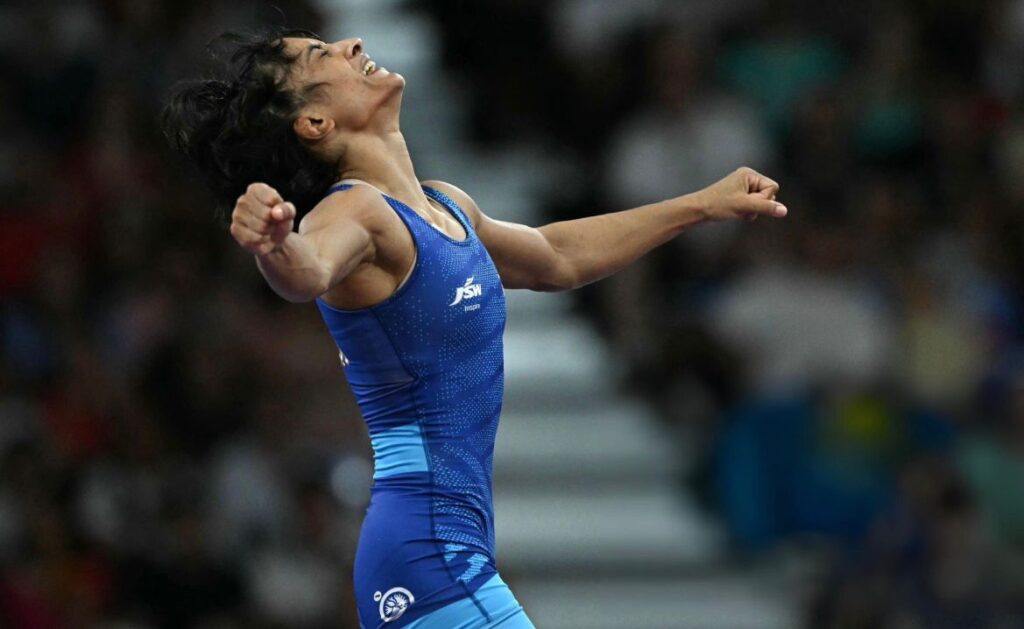
Boria Majumdar
If Vinesh Phogat is a catastrophe, Antim Panghal is a smaller bump for sure. Each one of us had pegged her as a possible Olympic medallist,even more so after the draw was announced. However, she did not even survive a minute and a half against a relatively unfancied opponent and lost 0-10. Her opponent lost in the very next round, proving that it was Antim who was nowhere near her potential.
Sources say that Antimjust about managed to make the 53kg weight limit. If Vinesh fell short by a 100 grams, Antim just about made it. But in trying to do so, she was starving for 48 hours and had no energy left when she entered the mat. Anyone who has starved for 48 hours without food and water would have suffered the same fate, raising questionsabout how well the wrestlers have been handled in Paris.
Wrestling is all about managing weight, and with both Vinesh and Antim, things haven’t worked out well. While one lost out on a possible gold medal, the other got knocked out in the first round of competition. In both cases, India lost two possible Olympic medals.
Am I alleging a conspiracy here? No. Am I alleging a political issue here? No. But is there a possible case of incompetence and mismanagement? Indeed, yes. How can one athlete, a possible gold medallist, add 2.7 kilos in weight after a recovery meal when the expectation was that she would add 1.5 kilos? And how is it that another, also a medal prospect, is forced to starve the last two days, so much so she is completely lethargic when she steps out to compete?
Is there a pattern here? How is it that the support team of sports scientists and nutritionists aren’t able to get our athletes to simulate the body weights they need? Why can’t basics be done when you are on the biggest global stage of all? And it is not the athlete. Rather, in a highly professional set-up, it is the responsibility of the support teams to ensure that the athlete gets these basics right.
For more news on the same:
Vinesh Phogat & Antim Panghal: Why can’t India manage weights of its athletes! https://t.co/mKr6luo3fs
— RevSportz Global (@RevSportzGlobal) August 7, 2024
Athletes don’t decide what to eat. They don’t decide how much fluid take in. That’s the job of the support team. They need to calibrate how the last two weeks leading into the competition should look like. They need to work things out in a manner that no athlete has to starve 48 hours so that she has no energy left. It is their job to protect the athlete and make sure he or she is in the best physical and mental shape. In India’s case, a botched nutrition programme made sure Vinesh was overweight and Antim lacked energy.
Did Sarah Hildebrandt, who Vinesh should have fought in the 50kg freestyle final, spend her Tuesday night skipping rope, cycling, having her hair cut, and sweating in a sauna till she suffered agonising cramps? Almost certainly not. How are our athletes supposed to compete with such rivals if the very basics are not done properly?
Who decides on the recovery meal? And who decides on the strategy for Antim in the lead up to the competition? We have heard a lot of glowing things about the coach and the support staff. Actions, however, suggest that a lot of questions can and need to be asked. Why was this done and on what basis? How could we not manage on the most important stage of all? While we are in the habit of blaming the athlete, it is time we ask some questions of the coaches and the support staff as well. They are accountable. As much in this case, if not more.
For more sports content: https://revsportz.in/




